Unidentified Aircraft Strikes Truck Convoy On Iraq-Syria Border
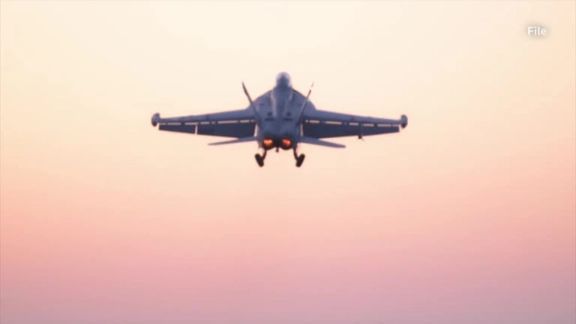
An unidentified aircraft conducted multiple air strikes on a 10-truck convoy stationed on the Syrian side of the Iraq-Syria border on Sunday night.

An unidentified aircraft conducted multiple air strikes on a 10-truck convoy stationed on the Syrian side of the Iraq-Syria border on Sunday night.
The information was confirmed by an Iraqi border official on Monday. The convoy had crossed into Syria from Iraq using the Qaim border crossing the day before. The air strikes resulted in the destruction of part of the convoy.
The Qaim border crossing is located near the Syrian town of Abu Kamal, also known as Al Bukamal. It is in close proximity to where the US military had carried out air strikes on the previous Friday. The US strikes targeted two facilities that were being used by Iran's Islamic Revolutionary Guard Corps and affiliated groups. The Pentagon stated that the strikes were a response to recent attacks against US forces in both Iraq and Syria.
On Monday, two sources from Iraqi militia groups reported that on Sunday, unidentified aircraft carried out air strikes on a facility utilized by the militia near Abu Kamal.
According to the sources, the building targeted in the attack had been vacated by militia fighters a day before with no casualties recorded.
Last week, the Pentagon disclosed that American troops in Syria and Iraq had faced multiple attacks from Iranian proxies between October 17 and October 24. Senator Cotton, speaking on Fox News, suggested that the Biden administration should consider the approach taken by the Trump administration when it targeted and killed Qassem Soleimani the IRGC’s Quds Force commander in January 2020.
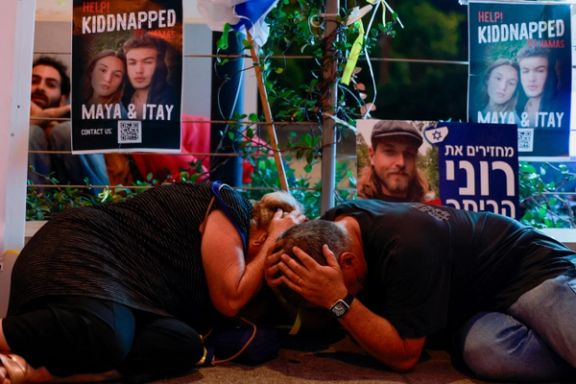
A young soldier of Iranian origin has been named as the latest victim confirmed dead following the Hamas massacre of October 7 in Israel.
In an emotional farewell, Shirel Haeimpour’s grandfather sang a traditional Jewish love song and a wedding song with his Esfahani Persian accent for the young woman who will never get to stand under the traditional canopy, or ‘chuppah’.
From the town of Rishon Lezion, Shirel’s loved ones gave moving speeches about her as Israel mourns the more than 1,400, mostly civilians, murdered on the day now considered the most deadly day for Jews since the Holocaust.
Another more than 230 have been taken hostage to Gaza, including babies and children.

It was her last weekend as a soldier in the mostly female base near Kibbutz Nahal Oz, one of the many villages where civilians were slaughtered and homes destroyed by the thousands of Hamas militants who invaded Israel by air, land and sea.
The girls’ duty was to watch the country’s most active border. The base had a policy of 'you see, you shoot’, the Gaza border a constant threat since Hamas took over control of the strip.
In a chilling recollection, her boyfriend Ariel Ben Uri, spoke of her constant fears that one day, Hamas would break through and invade, feeling that both the soldiers and the civilians around them were not safe from terrorist infiltration. “You were right,” he said, fighting back tears.
The youngest daughter of four, her brother Barak spoke of her bravery as she leapt out of bed as the tragedy unfolded to go straight to the emergency room. Hamas drones had blacked out the cameras meaning there were just minutes for the girls to alert others of an imminent attack.
“You saved lives and chose to help,” he said, speaking through his tears at the ceremony in Rishon Lezion, south of Tel Aviv.
News of her death was felt by the Iranian diaspora. Karmel Melamed wrote on X: “As an Iranian American I weep for Shirel Haeimpour, an innocent Iranian-Israeli young woman slaughtered by Hamas barbarians.
“She came from Isfahani (Esfahani) Jewish roots which are ancient. Just as we mourn the loss of Armita in Iran, we also mourn the loss of Shirel in Israel,” referring to a 16-year-old schoolgirl, who was pronounced dead after spending four weeks in coma in Tehran, following a scuffle with hijab police.
Among the murdered were hundreds of dual citizens from countries including France, the UK, and the US. Dozens of local Arabs and Bedouins were also murdered.
The hostages now include around 30 nationalities, Israelis, dual-nationals, foreign workers and tourists.
Hamas has demanded the release of 6,000 prisoners in return for the hostages, though it claimed recently 50 have died in Israeli airstrikes on the strip.
In 2011, Israel released over 1,000 Palestinians from its jails in return for one Israeli soldier, Gilad Shalit. In a bitter twist, many of them, including Hamas' leader in the Gaza Strip, Yahya Sinwar, ended up being among those who masterminded and executed the surprise attack on October 7.
Experts warn that the latest situation would set a dangerous precedent not only to Hamas but to Israel’s archenemy Iran. In August, the Biden administration agreed to unblock $6b of frozen Iranian funds in south Korea in exchange for five dual-national US-Iranians held hostage in Iran. Many warned at the time that the “largest ransom in history” would embolden the Iranian regime and other would-be hostage takers.
In the meantime, Israel has vowed to continue its ground invasion of Gaza until both Hamas is destroyed and the hostages are brought home, as the war enters its fourth week.

In response to growing regional tensions, a US Marine rapid response force is making its way toward the eastern Mediterranean Sea.
The 26th Marine Expeditionary Unit, stationed on the USS Bataan amphibious assault ship, has been operating in Middle Eastern waters in recent weeks but has shifted its course toward the Suez Canal, officials said.
The USS Bataan is currently positioned in the Red Sea and is expected to enter the eastern Mediterranean in the near future, bringing the Marine unit closer to Lebanon and Israel. Iran's proxies Hamas in Gaza and Hezbollah in Lebanon, continue to fire rockets into Israel and other regional proxies threaten to escalate activity following Hamas' declaration of war against Israel on October 7.
The strategic move holds significant implications as the US government has issued advisories for its citizens to leave Lebanon. A primary role of a Marine Expeditionary Unit is to assist in the evacuation of civilians.
Earlier this week, the White House emphasized the need for contingency planning for the potential evacuation of American citizens from the Middle East, including Israel and Lebanon. While planning is underway, the execution phase has not yet been reached. However, with Israel expanding its ground campaign in Gaza, the US embassy in Beirut has once again urged American citizens to leave promptly, highlighting the importance of departing a country before a crisis escalates.
Recently, the US State Department raised its travel advisory for Lebanon to Level 4: Do Not Travel, citing an elevated risk. Concerns have mounted over the potential for the conflict in Gaza to evolve into a broader regional crisis, with particular attention to Israel's northern border with Lebanon, where ongoing but low-level hostilities persist with Hezbollah, a potent Iranian proxy.
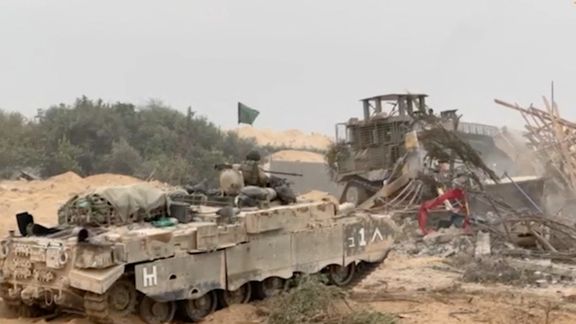
Israeli forces carried out airstrikes on targets in Syria and Lebanon Sunday evening, affiliated with the Lebanese Hezbollah and Iran's IRGC forces.
The Israel Defense Forces (IDF) confirmed the operations through posts on X, claiming that they had struck Hezbollah facilities in Lebanon.
The attacks came only hours after Hezbollah announced that its Secretary General Hassan Nasrallah would deliver a speech this Friday.
They first teased the news with a 10-second video, in which a figure resembling Nasrallah is seen walking past a Hezbollah logo on a wall. The mysterious clip went viral as viewers tried to decipher it.
Speculation is rife that Nasrallah's upcoming speech may involve some kind of declaration of war against Israel.
Hezbollah, backed by the regime in Iran, boasts an extensive stockpile of rockets, which makes it a far more formidable military force compared to Hamas.
On Sunday, before Israel confirmed striking Syria and Lebanon, reports had emerged that Hezbollah rockets had breached Israel’s missile defense system (Iron Dome), hitting a residential building in northern Israel.
The Biden administration has been trying hard to prevent a broader conflict, which would force it to enter yet another war in the Middle East exactly one year before the 2024 elections.
Critics of Biden’s foreign policy maintain that his reluctance to act tough (against Iran, in particular) would make the situation even more difficult for the US.
“What we need to do is send a clear and forceful message,” said Senator Tom Cotton on Sunday, “whether it’s striking IRGC officials in Syria or in Iraq, or striking directly at Iranian facilities inside Iran to make it clear that we won’t tolerate attacks on Americans throughout the region by Iranian proxies.”
Last week, the Pentagon revealed that American troops in Syria and Iraq had come under repeated attacks from Iran proxies in the week between 17 and 24 October.
Senator Cotton told Fox News that the Biden administration should learn from Donald Trump in assassinating Qassem Soleimani in January 2020.
“If we don’t do something like that,” he warned, “these attacks are going to continue until Americans are killed.”
Iranian officials have become increasingly boastful since Hamas attacked Israel on October 7, killing at least 1,400 and taking more than 200 hostage.
On Sunday, Iran's President, Ebrahim Raisi, took a typically brazen line, suggesting that Hamas forces were repelling the Israelis in Gaza –and that would be “a defeat heavier than the initial one for Israel.”
Reports from northern Gaza described fierce air and artillery strikes Sunday evening, affecting areas near Gaza City's Shifa and Al-Quds hospitals.
The Palestinian Red Crescent reported receiving warnings from Israeli authorities, urging the immediate evacuation of Al-Quds hospital, which currently shelters approximately 14,000 people.
International organizations say Gaza is facing an acute humanitarian crisis. The head of the UN agency for Palestinian refugees (UNRWA) has warned that "many more will die" in Gaza if the Israeli bombing and siege continues.
Calls for a humanitarian ceasefire have intensified in the past week. But Israel has rejected all such calls and announced that its ground operation would continue unabated.
Hamas officials say Israeli airstrikes on Gaza have so far killed more than 8,000 Palestinians, at least half of them women and children. These numbers cannot be independently verified.
The situation is dire as basic necessities like water and food have been cut off from the densely populated enclave of 2.2 million. Israel has allowed limited aid to enter in the past few days.
On Sunday, another 33 trucks were let in, containing water, food and medicine. But the humanitarian workers on the ground say the aid received so far falls desperately short of needs.
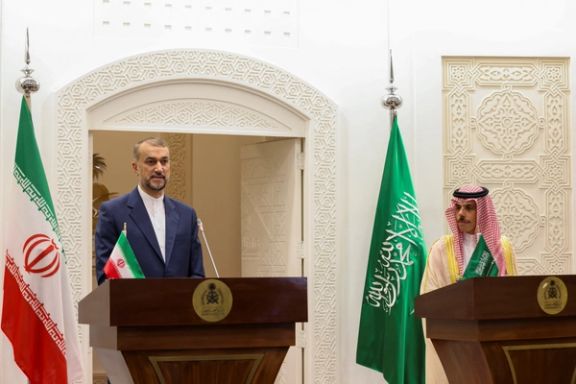
The Foreign Ministers of Iran and Saudi Arabia spoke about the ongoing situation in Gaza on Sunday as Israel and Hamas continued into week three of war.
Hossein Amir-Abdollahian, the Iranian Minister of Foreign Affairs, and his Saudi counterpart, Faisal bin Farhan, spoke by telephone according to the Iranian Students' News Agency (ISNA).
The conversation addressed what Amir-Abdollahian termed the "dangerous developments in the Gaza Strip" in familiar language reiterated by Iranian regime figures since Hamas declared war on October 7. The two apparently underscored "the pivotal role of the international community in achieving a ceasefire and safeguarding the civilian population, especially in light of the escalation of military operations", as Israel began targeted ground operations this weekend.
The engagement between Iran and Saudi Arabia follows their in-person meeting at the end of October during a session of the Executive Committee of the Organization of Islamic Cooperation held in Jeddah.
Last week, US President Joe Biden said a primary goal of Iran-backed Hamas' attack of October 7, the single most deadly day for Jews since the Holocaust, was to throw out normalization between Israel and Saudi, following deals with other Persian Gulf states under the Trump administration.
"One of the reasons Hamas moved on Israel ... they knew that I was about to sit down with the Saudis," Biden said. "Guess what? The Saudis wanted to recognize Israel."
Just days ago, the Deputy Commander of Iran's Revolutionary Guard, Ali Fadavi, claimed that Hamas had successfully disrupted efforts to normalize relations between Saudi Arabia and Israel with its attack, which it deemed a US conspiracy.
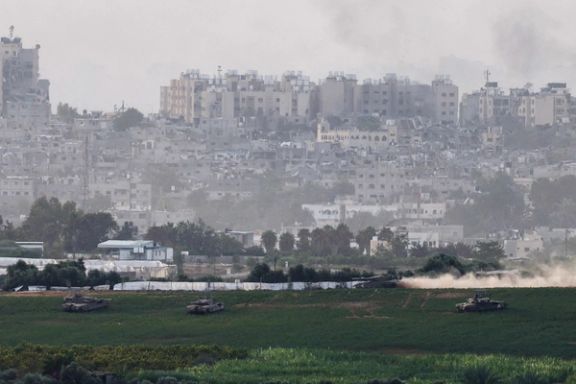
Both the US and Iran say they do not want the Hamas-Israel war to spiral out of control, but Iran roots for the militants and the US is beefing up its military presence in the region.
Iranian Foreign Minister Hossein Amir-Abdollahian said during an appearance on CNN Sunday that Iran does not want the Mideast war to "spread out."
"We always had political, media, and international support for Palestine. We have never denied this," he said, adding, "This is the truth, but in relation to this operation called the Al Aqsa Storm, there was no connection between Iran and this Hamas operation, not my government nor part of my country."
Earlier in the day, Iranian President Ebrahim Raisi renewed threats to Israel and the US after Israel launched the ground offensive in Gaza. "The Zionist regime's crimes have crossed the red lines, which may force everyone to take action," he said, suggesting once again the threat of action from its proxies in the region.
White House national security spokesperson John Kirby said Sunday that he would not comment on the expanded ground operation, but he said Washington supported Israel's right to defend itself. "We're not drawing red lines for Israel," he added.
Authorities in the Iranian regime issue fiery statements, threatening escalation in the Gaza war, but they have not taken any concrete steps on the ground to underpin their claims. Media outlets affiliated with the regime and its Revolutionary Guards cite local media about attacks on US bases, but no Western source confirms such reports.
Two US fighter jets struck Iran-linked military facilities in Syria early Friday, a few hours after 900 more US troops arrived in Syria to bolster air defenses for American personnel amid a surge in attacks by Iran-backed militias. Earlier, White House spokesman John Kirby confirmed that Washington has “relayed direct message” to Iran after Biden reiterated its “warning to the Ayatollah,” referring to Iran’s ruler Ali Khamenei.
The Kremlin said Friday that the US strikes show broader regional tensions but claimed there is no danger of Russia being dragged into the conflict. The statement came as Moscow's decision to invite a Hamas delegation has outraged Israel, which urged Russia to expel the group, calling the invitation "deplorable".
The United States has moved 'naval cities' to the region, a move that can be construed as a more consequential move than the symbolic trip by President Joe Biden to Israel to see with his own eyes the aftermath of Hamas attack that killed 1,400 Israelis. What can the US president do for over 220 hundreds of hostages, including Americans, from Tel Aviv that he cannot do from the White House?
As the war between Israel and Hamas reverberates across the Middle East, the risk of war between Hezbollah and Israel remains higher than at any point since their last big conflict in 2006. Reuters cited unnamed sources as saying that Hezbollah knows that Lebanon, with a struggling economy and a crumbling state, cannot afford another war between Hezbollah and Israel. "Hezbollah has no interest in war. Lebanon has no interest in war", a source familiar with Hezbollah thinking said.
Israel has time and again explained to the international community how most regional vices are done by tentacles of the Islamic Republic regime. After all, even if it is possible for Israel to eliminate Hamas militants, they will resurrect thanks to Ayatollah’s deep pockets being endlessly fed with oil money.
Immediately after the multi-thronged operation that Hamas calls al-Aqsa Flood, proclaiming its goal of flooding Israelis out of al-Aqsa, Iran and several other countries and world bodies started urging not to escalate the conflict. Israel has started testing the waters of a ground invasion but wants the world to side with it in the war that according to Palestinian authorities has killed over 7,000 Palestinians.
Israel, which had depended heavily on its military tech and intelligence to control sporadic attacks by the Islamist attacks and was caught by surprise -- has called up hundreds of thousands of reservists, its largest-ever. To acclimate the new army, whose forces have mostly been far from the military atmosphere, the US may be stalling before the conflict enters the next phase, an idea popping up in conversations about the Mideast crisis.
The reason that Iran does not take US warnings seriously and calls them “requests” is the lack of – or very limited – response to attacks on US troops by Iran-backed forces. Iranian President Ebrahim Raisi’s deputy chief of staff for political affairs Mohammad Jamshidi “does not take President Biden’s warnings seriously,” said Jason Brodsky, the policy director at United Against Nuclear Iran. “That should tell the White House something especially after over 13 attacks on US forces in October,” he added.
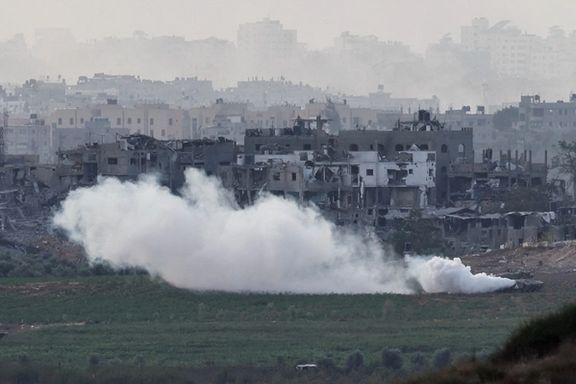
No major blow has been delivered against Tehran and its proxies, except for the targeted killing of IRGC’s Quds force commander Qasem Soleimani, the architect of Iran’s vast network of militias in the region. US Senator Rick Scott (R-FL) used Soleimani as an example of how the US should deal with the menace of Iran. “If Iran attacks the United States, everything the Ayatollah loves will be a target, and as you know, our aim is very good. Ask Soleimani,” he said on X (formerly twitter).
The war of words and visits to the region along with international meetings can be a prelude to the next phases of the conflict that may set the ground for World War III, that probably ensues after China joins Russia and Iran against the West.
The US has deployed large military power to near Israel but claims it will not engage in the conflict and pursues diplomacy to resolve the crisis. Biden also emphasized that its warning was about attacks on US forces and had “nothing to do with Israel at all.” However, 'Ayatollah,' who believes “diplomacy and battleground” are two complementary things which do not negate each other, claims Israel will not exist to see 2045 and moves toward his dream with material and psychological support.